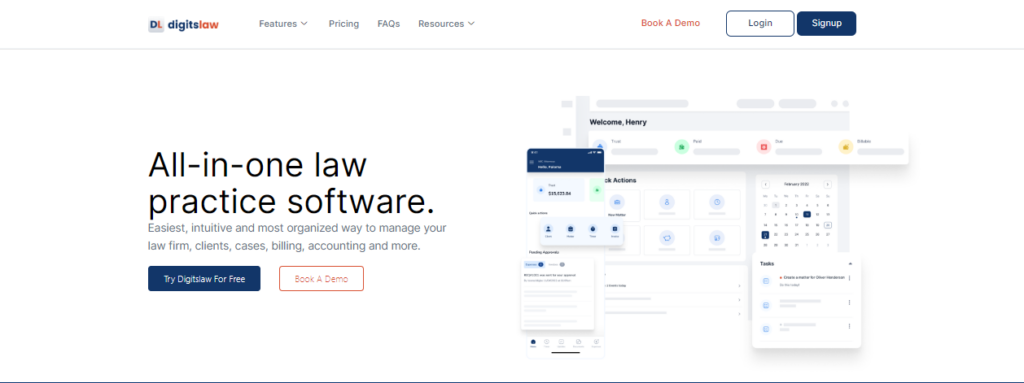In the legal profession, success is often a reflection of a lawyer’s adaptability to emerging trends and mastery of essential skills. As we stride into 2024, the demands placed on legal practitioners continue to transform, driven by technological advancements and shifting client expectations. To thrive in this dynamic space, lawyers need some key lawyer skill to adapt and equip themselves with skills beyond traditional legal knowledge. In this blog post, we take a look at the top eight lawyer skills you need in order to run a successful legal practice.

What are Lawyer Skills?
Lawyer skills encompass a diverse set of abilities that enable legal professionals to navigate the complexities of the legal system and serve their clients effectively. Foremost among these skills is legal research and analysis, where attorneys must adeptly navigate statutes, case law, and legal precedents to build a strong foundation for their cases. The ability to communicate persuasively, both in writing and orally, is equally crucial. Lawyers must craft compelling arguments, draft clear and concise legal documents, and present their cases convincingly in court or during negotiations. Beyond the traditional skills, technology and marketing have also become very important in recent years and legal professionals must learn to adapt.
The 7 Top Lawyer Skills in 2024
Communication
Lawyers must be able to communicate well. Effective communication is not just a desirable skill for lawyers; it’s fundamental to their success. From presenting powerful arguments in court to guiding clients through complex legal processes, the ability to communicate clearly and persuasively is paramount.
Legal tech software is a tool that makes this easier. For example, Digitslaw has a client portal that allows you to share important dates and case reminders with your clients. You can also send invoices, case information and updates with your clients making it easy to keep them in the know at all times.
Technology Skills
Today, being tech-savvy is essential for any lawyer. This means being comfortable using legal technology, such as case management software, e-discovery platforms, and artificial intelligence (AI) tools. Lawyers who can leverage technology to their advantage will be more efficient, productive, and effective.
With the increasing digitization of legal documents and information, lawyers must possess advanced skills in e-discovery and legal research tools. These tools enable lawyers to efficiently search and analyze vast amounts of legal data, saving time and improving the accuracy of their research. Lawyers also handle sensitive client information, making data security and privacy skills vital. Lawyers should be familiar with cybersecurity measures, encryption techniques, and data protection protocols to safeguard client confidentiality and comply with privacy regulations.
Analytical Skills
This is essential for lawyers to excel in their profession. This skill enables lawyers to effectively analyze complex legal issues, identify relevant facts, and develop strong legal arguments. In an increasingly data-driven world, lawyers with strong analytical skills have a competitive edge in providing accurate and strategic legal advice.
Lawyers often face complex legal problems that require analytical thinking to find effective solutions. They must analyze the available options, assess the potential risks and benefits, and develop strategies to achieve their clients’ objectives. Through logical and systematic problem-solving, lawyers can navigate legal challenges and provide innovative solutions.
Data Analytics
The ability to analyze and interpret vast amounts of legal data will become an indispensable skill in 2024. Lawyers who can effectively extract insights from complex legal databases, understand patterns, and predict outcomes will have a significant advantage. Data-driven decision-making will not only streamline legal processes but also help lawyers provide more accurate advice to their clients.
Data analytics can also be used to evaluate the performance of legal teams and individual lawyers. By analyzing data on billable hours, case outcomes, client satisfaction, and other relevant metrics, law firms can identify areas for improvement, allocate resources effectively, and optimize their operations.
Adaptability
The legal profession is no stranger to change, and in 2024, lawyers will need to embrace adaptability and resilience more than ever. Rapid advancements in technology, shifting legal regulations, and evolving client expectations will require lawyers to quickly adapt and navigate unfamiliar territory. Those who can embrace change and learn new skills will thrive in this ever changing environment.
Technology plays an increasingly significant role in the legal profession. Lawyers need to adapt to new technologies, such as legal research tools, e-discovery platforms, and virtual meeting platforms, to streamline their work processes, enhance efficiency, and deliver better client service.
Time Management
Effective time management is a critical skill for lawyers to achieve success in their professional lives. With demanding caseloads, client meetings, court appearances, and administrative tasks, lawyers must master the art of managing their time efficiently to meet deadlines and maintain a healthy work-life balance.
To improve time management skills, lawyers can implement several strategies. Firstly, they can create a daily schedule or to-do list to prioritize tasks based on urgency and importance. Utilizing a calendar and a practice management software to stay organized and ensure they allocate sufficient time for each task.
Digitslaw is a legal practice management software that allows lawyers track billable hours from anywhere. With Digitslaw, lawyers can easily record their time while in court, at client meetings, or working remotely. This ensures accurate timekeeping and eliminates the need for manual entry later.
Cultural Competence and Diversity
With globalization, lawyers must be culturally competent and sensitive to the needs of diverse clients. Understanding different legal systems, cultural norms, and ethical frameworks will be crucial for providing effective legal advice in a globalized world. Lawyers who can navigate cultural differences and foster inclusive environments will be better equipped to serve clients in an increasingly interconnected society.
How can Using Legal Tech Help You Grow Your Legal Skills?

Integrating legal technology into your practice can significantly contribute to the growth and enhancement of your legal skills. One key area where legal tech proves invaluable is research. By utilizing advanced search capabilities and databases offered by legal tech tools, you can streamline the process of information retrieval and analysis. This efficiency not only strengthens your research skills but also allows you to stay updated on the latest developments.
Additionally, legal tech facilitates document automation and management, providing an opportunity to optimize your workflow. These tools enhance your organizational skills as you become adept at creating, storing, and retrieving legal documents more efficiently. This not only improves time management but also contributes to overall productivity. Furthermore, the automation of routine and repetitive tasks through legal tech frees up your time, allowing you to focus on more complex and strategic aspects of your practice.
To streamline your process, it is more effective to have all these tools in an all in one practice management software like Digitslaw. Practice management software also allows you to perform legal analytics that will help streamline your operation, focus on high-ROI, and eliminate time waste. The world is becoming increasingly technology-based, and forward-thinking lawyers embracing these new trends will stay ahead in this highly competitive industry.







